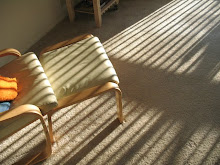----
An inspiration for a project on imagery:
"From now on, on your way to school, or on your way home, find something beautiful to notice. It doesn't have to be something you see it could be a scent - perhaps of freshly baked bread wafting out of someone's house, or it could be the sound of the breeze slightly rustling the leaves in the trees, or the way the morning light catches the autumn leaf as it falls gently to the ground.
Please look for these things, and cherish them. For, although it may sound trite to some, these things are the stuff of life. The little things we are put here on earth to enjoy. The things we often take for granted. We must make it important to notice them, for at any time...it can all be taken away.
The class was completely quiet. We all picked up our books and filed out of the room silently. That afternoon, I noticed more things on my way home from school than I had that whole semester.
Every once in a while, I think of that teacher and remember what an impression she made on all of us, and I try to appreciate all of those things that sometimes we all overlook. Take notice of something special you see on your lunch hour today. Go barefoot. Or walk on the beach at sunset. Stop off on the way home tonight to get a double-dip ice cream cone.
For as we get older, it is not the things we did that we often regret, but the things we didn't do. Life is not measured by the number of breaths we take, but by the moments that take our breath away."
Please look for these things, and cherish them. For, although it may sound trite to some, these things are the stuff of life. The little things we are put here on earth to enjoy. The things we often take for granted. We must make it important to notice them, for at any time...it can all be taken away.
The class was completely quiet. We all picked up our books and filed out of the room silently. That afternoon, I noticed more things on my way home from school than I had that whole semester.
Every once in a while, I think of that teacher and remember what an impression she made on all of us, and I try to appreciate all of those things that sometimes we all overlook. Take notice of something special you see on your lunch hour today. Go barefoot. Or walk on the beach at sunset. Stop off on the way home tonight to get a double-dip ice cream cone.
For as we get older, it is not the things we did that we often regret, but the things we didn't do. Life is not measured by the number of breaths we take, but by the moments that take our breath away."
-Anon., from a story The Teacher (A Powerful Lesson)
We start imagery journals next week. One day of recording "seeing, hearing, feeling, tasting, and smelling." It should be good.
Photo: Painting by Edward Hopper, can be found here.












